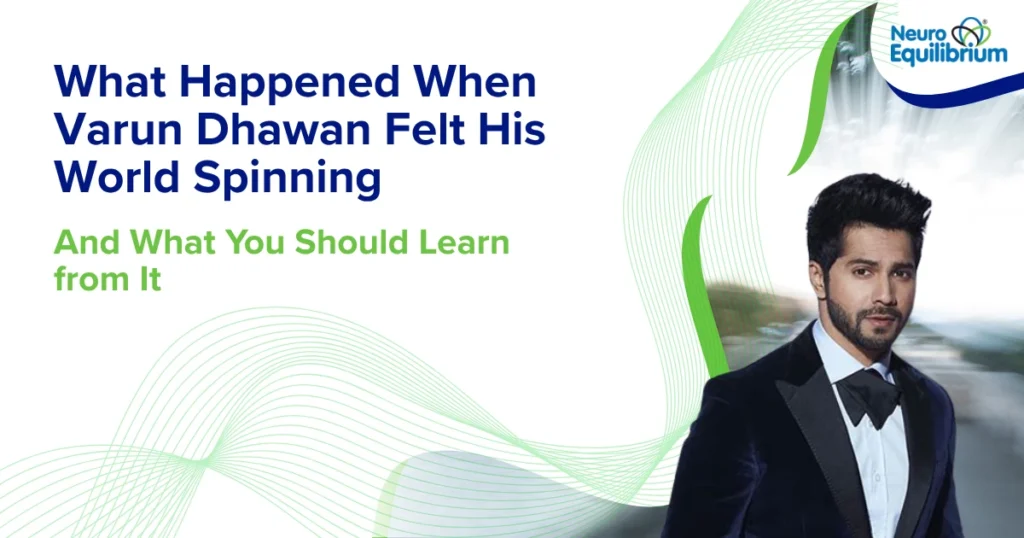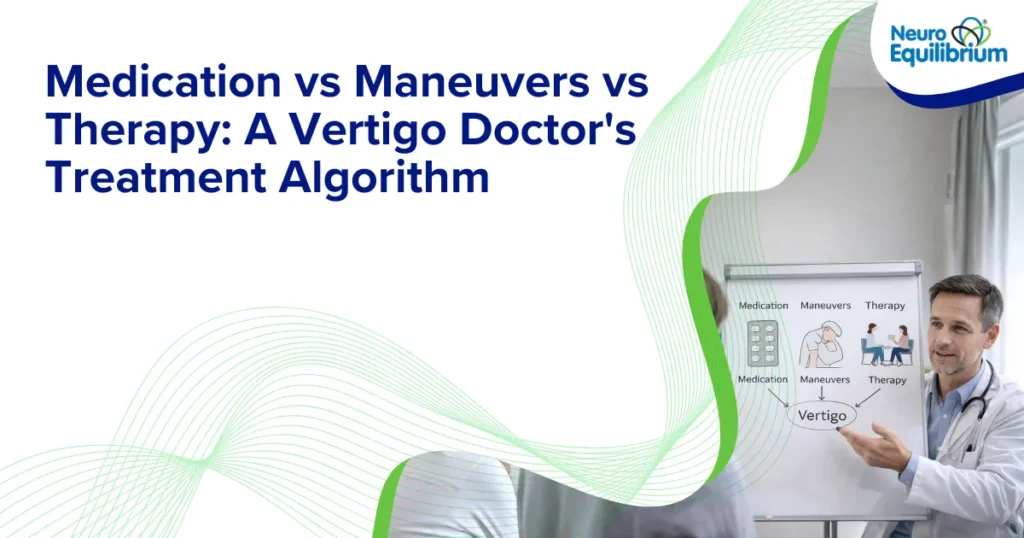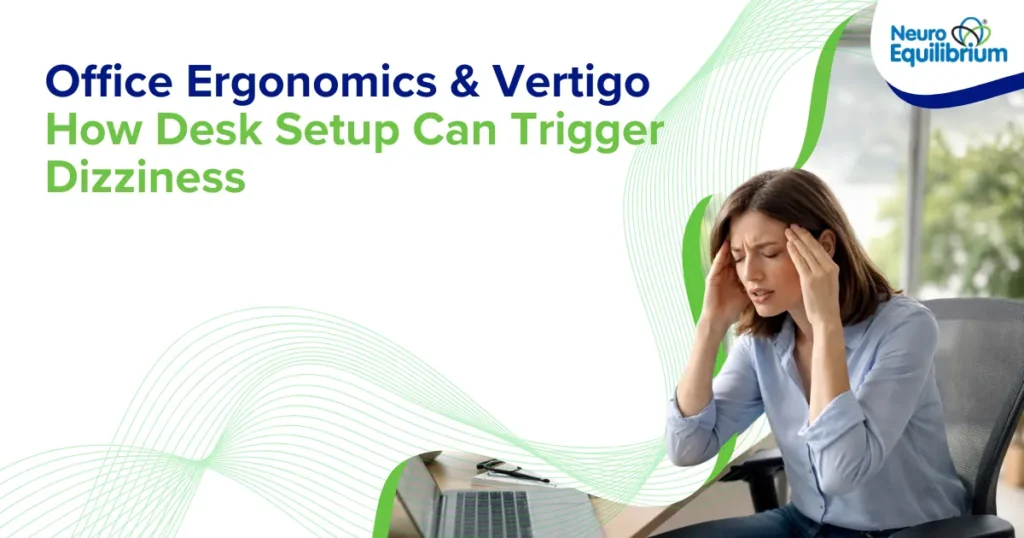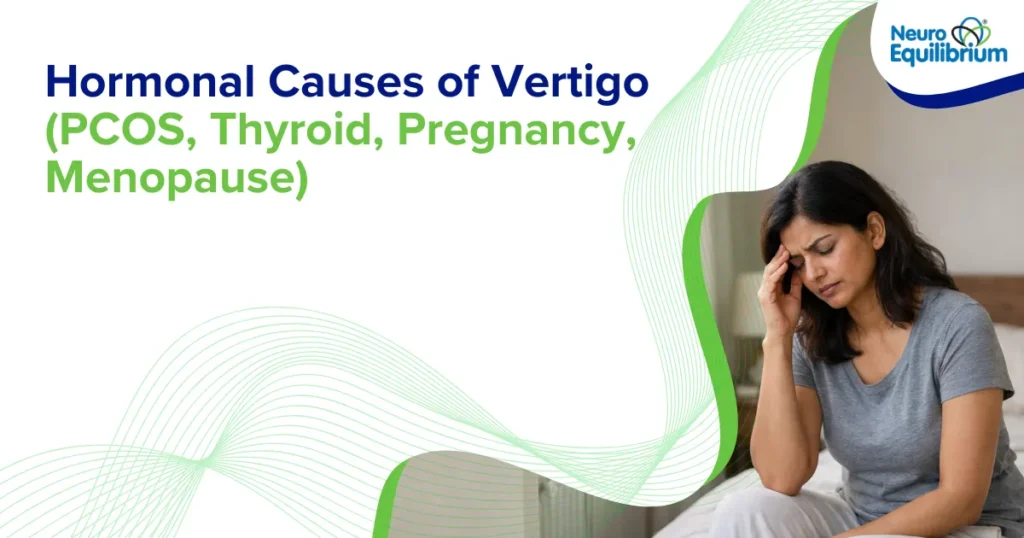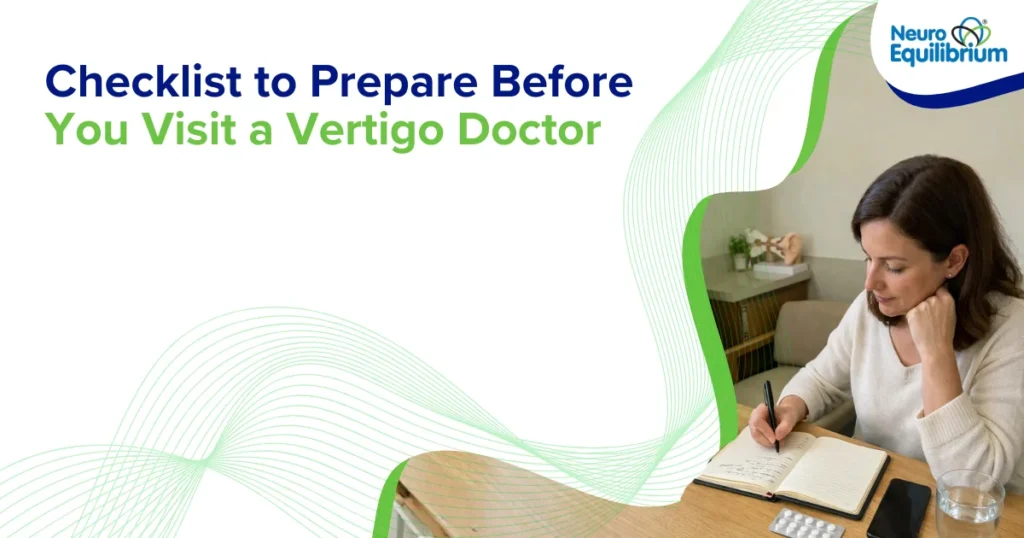Bollywood actor Varun Dhawan publicly shared a frightening experience: he felt his “world spinning” and lost his balance. This happened during a very busy time after the COVID-19 pandemic, while he was filming for the movie JugJugg Jeeyo.Varun explained that he felt like he had just turned off and did not know why it was occurring. He visited a doctor, who diagnosed him with vestibular hypofunction, a disorder that plays in the inner ear and interferes with the body balance.
Why Did It Happen to Varun Dhawan?
He believes the condition was brought on by pushing his body too hard and ignoring early signs of stress. “I was working my head off,” he said, describing how he kept going without pause after the pandemic. “This is a mere race, and no one is questioning why we are running.”
Many people are unaware that dizziness and blurry vision often occur together. This is because the inner ear and visual systems work in coordination to help maintain balance and clear vision. When the signals from your eyes do not align with what your inner ear is communicating to your brain, it can cause a range of unsettling symptoms. These may include sensitivity to motion, a persistent feeling of unsteadiness, and difficulty focusing, which can lead to blurry vision. In some cases, such symptoms may also be early indicators of more serious neurological conditions.
What is Vestibular Hypofunction?
This condition closely resembles what actor Varun Dhawan described when he talked about being diagnosed with a vestibular disorder. He mentioned feeling dizzy, tired, and a bit unsteady, these are common signs of vestibular hypofunction.
Vestibular hypofunction occurs when your inner ear (the part of your body that keeps your balance) fails to perform properly. Your eyes and muscles together with the vestibular system keep you steady. When it does not work, your brain receives mixed messages, which results in symptoms such as:
- Dizziness or vertigo (a spinning sensation)
- Feeling off-balance and unsteady
- Blurry vision or other visual problems
- Nausea and sometimes vomiting
- Trouble walking, especially in crowded or dark places
- A feeling of motion when things move quickly around you
This condition can be caused or triggered by things like stress, viral infections, or pushing your body too hard.
If you notice these symptoms, especially if they are persistent or interfere with your daily life, you should consult a healthcare provider, preferably an ear, nose, and throat specialist or neurologist. Diagnosis usually involves:
- Review of your medical and symptom history
- Physical and neurological examinations
- Specialized tests
How to Prevent Vestibular Hypofunction
While many causes of vestibular hypofunction (like infections, head injuries, aging, or some medications) may not be completely avoidable, you can take steps to minimize your risk or reduce the impact:
- Manage underlying health conditions, for example, control diabetes and cardiovascular health
- Taking precautions to prevent falls
- Avoid medications that can damage the inner ear unless prescribed and monitored by your doctor
- Treat ear infections promptly to avoid complications
- Maintain regular physical activity to support balance and coordination
- Manage stress to reduce its impact on your vestibular system
- Manage anxiety, which can worsen balance issues and dizziness
Know More About Vertigo
- What is Vertigo? Causes, Symptoms, & Treatment
- Do You Need a Vertigo Specialist? When to See One & How to Choose
- Top 3 Essential Vertigo Tests: How to Identify and Manage Balance Disorders
- How Vertigo Is Diagnosed at NeuroEquilibrium
How Vestibular Disorders Are Diagnosed and Treated
Doctors use special tests to figure out what’s causing vestibular disorders. These can include:
- Clinical vestibular testing: Such as Videonystagmography (VNG), Video Head Impulse Test (vHIT), and caloric tests, which check how your eyes and inner ear respond.
- Vestibular rehabilitation therapy: This involves specific exercises to help retrain your brain and body to improve balance.
- Lifestyle changes: Including managing stress, staying hydrated, improving posture, and giving your eyes breaks from screens.
How NeuroEquilibrium Can Help
If you or someone you know is experiencing symptoms similar to what Varun Dhawan described such as dizziness, fatigue, unsteadiness, or blurry vision it’s important not to ignore them. At NeuroEquilibrium, we specialize in diagnosing and treating balance and vestibular disorders using a comprehensive and personalized approach.
We are India’s largest chain of super-specialty clinics focused exclusively on vertigo, dizziness, and balance-related conditions. Here’s how we can help:
- Advanced Vestibular Testing: We use state-of-the-art diagnostic tools like the Video Head Impulse Test (vHIT), Vestibular Evoked Myogenic Potentials (VEMP), and Dynamic Visual Acuity (DVA) to accurately assess the function of your balance system.
- Accurate Diagnosis: Our technology driven assessments ensure we identify the exact cause of your symptoms, allowing for more targeted treatment. Our specialised and experienced team brings expertise in vestibular disorders, ensuring you receive the highest quality care.
- Customized Vestibular Rehabilitation: We design individualized therapy programs based on each patient’s condition, helping them regain stability and confidence over time.
- Widespread Network: With over 220 clinics across India, expert care is accessible no matter where you are.
Our team manages a wide range of conditions, including Vestibular Hypofunction, BPPV, Vestibular Migraine, Ménière’s Disease, and other neurological balance disorders.
At NeuroEquilibrium, our goal is to help you return to daily life with clarity, confidence, and control. Reach out to book a consultation and take the first step toward a more stable tomorrow.
Conclusion
Varun Dhawan’s experience is a powerful reminder of why it is important to listen to your body. Ignoring early signs such as fatigue, dizziness, or imbalance can lead to more serious health issues. Stress is not only a mental concern; it can also take a toll on your physical well-being, including your balance system. Getting a timely medical evaluation can make a significant difference, as early diagnosis often leads to better and faster recovery. Symptoms like blurry vision, nausea, or feeling unsteady should never be dismissed, as they may point to underlying conditions. Most importantly, Varun’s reflection on the need to find a greater purpose encourages all of us to reassess our priorities and understand that our health must come before the pressure to keep pushing forward.
Sources
- Vestibular Disorders Association. “Bilateral Vestibular Hypofunction or Loss (BVH/BVL).” Vestibular Disorders Association website. https://vestibular.org/article/diagnosis-treatment/types-of-vestibular-disorders/bilateral-vestibular-hypofunction/ (Vestibular Disorders Association)
- UCSF Otolaryngology. “Vestibular Hypofunction — Causes, Symptoms, and Treatment.” https://ohns.ucsf.edu/balance-falls/vestibular-hypofunction (Otolaryngology Head and Neck Surgery)
- ModernOD. “Vestibular Disorders and Visual Dysfunctions.” 2023 article on vision–vestibular interactions & visual symptoms (blurry vision, dizziness) in vestibular disorders. https://modernod.com/articles/2023-oct/vestibular-disorders-and-visual-dysfunctions (modernod.com)
- Star Health. “Vestibular Hypofunction — Symptoms and Diagnosis.” (Indian-oriented health portal) https://starhealth.in/symptoms/vestibular-hypofunction-symptoms-and-diagnosis/ (Starhealth)
- News coverage: “Explained — What is Vestibular Hypofunction that Varun Dhawan is suffering from.” (on LiveMint) https://www.livemint.com/science/health/explained-what-is-vestibular-hypofunction-that-varun-dhawan-is-suffering-from-11667915453312.html (mint)
- Press article: “Varun Dhawan shares his vestibular hypofunction diagnosis.” (on Times of India) https://timesofindia.indiatimes.com/life-style/health-fitness/health-news/varun-dhawan-shares-his-vestibular-hypofunction-diagnosis-heres-what-the-condition-is-and-its-symptoms/photostory/95375536.cms (The Times of India)
- Indian Express. “Vestibular Hypofunction Causes: Varun Dhawan & Age?” (on his condition and typical symptoms like dizziness, blurred vision, imbalance) https://indianexpress.com/article/lifestyle/health-specials/varun-dhawan-vestibuluar-hypofunction-health-tips-8251266/ (indianexpress.com)
What is vestibular hypofunction, and how did it affect Varun Dhawan?
Vestibular hypofunction is a balance disorder which is affected problem of Varun Dhawan’s inner ear causing him dizziness, unsteadiness, and blurred vision.
What are common symptoms of vestibular hypofunction?
The symptoms are vertigo, unsteadiness, blurred vision, nausea, difficulty in walking particularly in visually or physically challenging situations.
Can stress really trigger balance disorders like Varun Dhawan?
Yes, persistent stress and overwork may aggravate or even cause vestibular problems because it makes your body less able to handle sensory input.
How are vestibular disorders diagnosed?
Tests such as VNG, caloric, and Dynamic Visual Acuity (DVA), Subjective Visual Vertical (SVV) may be used by doctors to determine the effectiveness of your inner ear and eyes to motion and may be used to determine the underlying cause.
Where can I get expert help for dizziness and balance problems in India?
NeuroEquilibrium Clinics provide a network of more than 220 locations where they provide advanced vestibular testing and rehab therapy.






